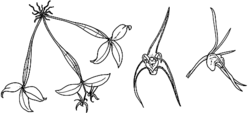Common name: Tree Spider Orchid
Dendrobium tetragonum A.Cunn. APNI* Synonyms: Tetrabaculum tetragonum (A.Cunn.) M.A.Clem. & D.L.Jones APNI*

Description: Epiphyte with stems spreading to pendent, thin and wiry in the basal half, succulent, swollen and square in cross section in the upper half, tapering towards apex, rooting only at base, 6–45 cm long, 7–9 mm diam., with 2–5 leaves at apex; roots smooth, creeping.
Leaves spreading to erect, elliptic, 3–8 cm long, 15–25 mm wide, conduplicate, acuminate, thin, smooth.
Inflorescences 0.5–4 cm long, 1–5-flowered. Sepals green to deep dull yellow, usually with reddish margins or other markings; lateral petals green to deep dull yellow; dorsal sepal 19–60 mm long, 2–3 mm wide; labellum cream, usually with reddish striations, 8–10 mm long, 6–10 mm wide. Column 2.5–4 mm long; column foot 5–6 mm long.
Flowering: September to October
Distribution and occurrence: Grows on rainforest trees and along streams; north from the Illawarra region.
NSW subdivisions: NC, CC
Other Australian states: Qld
Dendrobium tetragonum comprises a range of morphotypes, and these have been formally recognised as varieties or species. The molecular evidence available to date supports a geographic division within D. tetragonum into a northern Wet Tropics lineage, and a south-eastern lineage. The first corresponds with larger flowered forms that have been recognised as D. tetragonum var. giganteum or D. capitisyork and D. cacatua. The second contains D. tetragonum var. tetragonum and D. tetragonum var. melaleucaphilum. Unfortunately, D. capitisyork and D. cacatua appear to represent extremes in clinal variation in the intensity of red pigmentation in flowers that has both altitudinal and latitudinal components, with plants from higher elevations in the southern Wet Tropics lacking red pigmentation entirely. Similarly, while there is no doubt that plants of D. tetragonum recognised as separate taxa in south-eastern Australia differ in flower shape, size, and colour, but whether those differences reflect separate species status has not been addressed empirically. Therefore we adopt a conservative stance on the circumscription of D. tetragonum which treats morphotypes in New South Wales as varieties. Publication of empirical evidence supporting separate species status for these varieties will result in their being recognised as such.
Text by P. H. Weston, updated by Matt A.M. Renner (23 October 2020)
Taxon concept: Flora of NSW 4 (1993)
| | Key to the varieties | |
| 1 | Dorsal sepal 19–30 mm long; labellum 6–8 mm wide; sepals with strong red pigmentation along margins. | var. tetragonum |
| Dorsal sepal 38–60 mm long; labellum 7–9 mm wide; sepals with minimal red pigmentation on margins. | var. melaleucaphilum |
APNI* Provides a link to the Australian Plant Name Index (hosted by the Australian National Botanic Gardens) for comprehensive bibliographic data
***The AVH map option provides a detailed interactive Australia wide distribution map drawn from collections held by all major Australian herbaria participating in the Australian Virtual Herbarium project.
|


